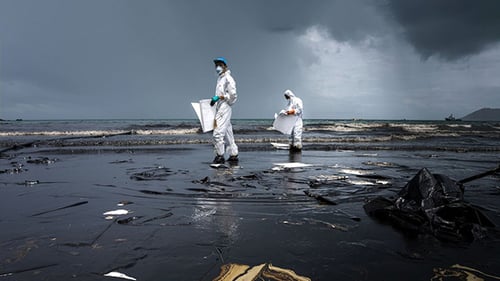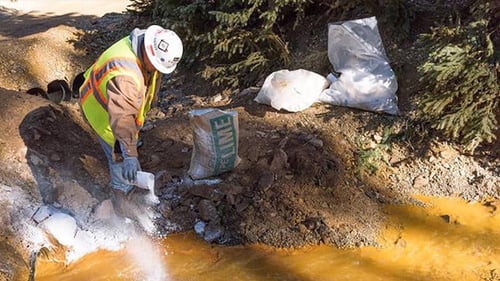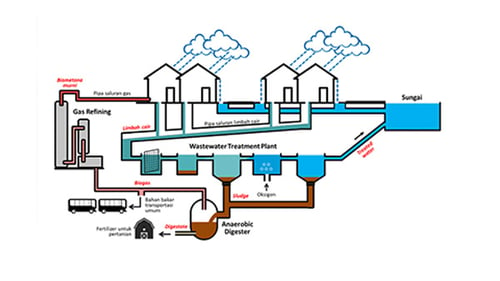In the realm of the oil and gas industry, chemical waste handling plays a crucial role in ensuring operational efficiency and maintaining ecological balance. Dealing with the diverse types of chemical waste, from biodegradable to potentially polluting, requires careful and efficient management strategies. These chemical wastes come from various sources in the oil and gas industry, including exploration, production, refining and equipment maintenance processes. The impacts of these wastes on the environment can be significant, ranging from water and soil pollution to adverse effects on marine life and human health.
Additionally, chemical waste in this industry often contains hazardous components such as hydrocarbons, heavy metals, and other toxic chemicals that can cause long-term damage to ecosystems if not managed properly. This demands the application of methods that are not only effective in reducing the volume and toxicity of waste, but also that apply the principles of sustainability and environmental responsibility.
The importance of chemical waste management is not only limited to meeting strict environmental regulations, but also in the context of corporate social responsibility. With increasing public awareness of environmental and sustainability issues, companies that successfully implement effective and responsible waste management practices can enhance their reputation and gain greater trust from the public.
This article thoroughly explores the latest strategies in chemical waste management that not only support operational efficiency but also protect our environment and sustainability. We will explore approaches that have proven effective in the global oil and gas industry, including the use of advanced technologies, the application of ecological principles in waste management, and innovations in waste treatment and reduction methods.

Chemical Waste in the Oil and Gas Industry
Chemical wastes in the oil and gas industry are byproducts of various extraction and refining processes. These processes are not only complex but also utilize different types of chemicals that serve to improve the efficiency and effectiveness of extraction. From solvents to diluents, the variety of chemicals used covers a broad spectrum and often contain hazardous substances that require careful management.
The composition of these chemical wastes ranges from light hydrocarbons to heavier components such as heavy metals and asphaltenes, each with its own management challenges. Processes such as drilling, refining, and processing crude oil generate different wastes, including produced water containing oil, drill mud, and solid waste contaminated with chemicals.
The importance of waste management cannot be underestimated. Waste that is not managed properly can cause serious pollution. This pollution not only impacts the natural environment such as marine ecosystems and water sources, but also has the potential to disrupt the health of communities in areas surrounding industrial operations.
Furthermore, the challenge in managing these chemical wastes lies in their diversity. Each type of waste requires a specific approach in its treatment, ranging from physical, chemical, to biological methods. Advanced technologies such as centralized waste treatment and integrated waste management systems play a vital role in handling these wastes efficiently and safely.
Hence, waste management in the oil and gas industry is not just a technical issue, but also involves ethical and environmental considerations. The industry is under the close scrutiny of various regulatory agencies, both at national and international levels. These standards and regulations aim to ensure that chemical waste is managed in a way that minimizes negative impacts on the environment and society.
Challenges in Chemical Waste Management
Chemical waste management in the oil and gas industry is faced with various challenges. Large and diverse waste volumes not only make the management process complex but also pose logistical and storage challenges. Each stage of oil and gas operations, from drilling to final processing, generates different types of waste, each with its own characteristics and risks.
In addition to volume and diversity, chemical waste often contains hazardous and toxic substances that require special handling to prevent environmental pollution and health risks. Components such as hydrocarbons, heavy metals, and reactive chemicals must be managed in a safe manner to prevent leaks, spills, or uncontrolled releases into the environment.
Strict regulations regarding waste disposal and treatment add to the complexity of this task. Companies must comply with a series of rules and standards set by environmental authorities at local, national and international levels. These standards are designed to protect the environment, but they also demand significant investment in waste treatment technology, employee training, and waste management infrastructure.
In addition, there are challenges related to public perception and corporate social responsibility. The public is increasingly aware of the environmental impact of the oil and gas industry, and companies in this sector are under intense scrutiny from environmental and community groups. This means that failure to manage chemical waste effectively can result not only in legal fines and remediation costs, but also damage to reputation and public trust.
Overcoming these challenges requires a well-rounded approach, which relies not only on advanced technology, but also management best practices, continuous innovation, and a strong commitment to sustainability and environmental safety.

Chemical Waste Management Strategy
Some effective strategies in chemical waste management are:
Waste Minimization
This step focuses not only on reducing the amount of waste generated, but also on reducing the hazardous nature of the waste. Processes such as optimization of chemical reactions, use of more effective catalysts, and replacement of raw materials with greener alternatives can contribute greatly to this strategy. A holistic approach to the life cycle of products and processes can identify opportunities to reduce waste at source.
Recycling and Reuse
This strategy involves identifying waste that can be recycled or reused in other processes. It includes not only the reutilization of chemicals in industrial processes but also the conversion of waste into products or energy. For example, the use of waste heat from industrial processes for heating purposes or electricity production. This approach not only reduces the waste load but also improves resource efficiency.
Advanced Processing
Beyond traditional methods, innovative technologies such as electrocoagulation, ozonation, or the use of nanotechnology in sewage treatment open up new opportunities in dealing with chemical wastes. These approaches are often more effective in treating complex or hazardous wastes and can be tailored to the specific needs of a particular effluent.
Training and Awareness
This aspect includes not only employee training on waste management procedures and policies but also education regarding the environmental and social impacts of improper waste management. Ongoing training programs and awareness campaigns can build an environmentally responsible corporate culture, as well as improve compliance and operational effectiveness.
By combining these approaches, the oil and gas industry can significantly reduce the environmental impact of its operations, comply with stringent regulations, and build a positive reputation for sustainability and environmental responsibility.

The Role of Technology in Waste Management
Technological developments provide great opportunities in chemical waste management. Innovations in smart sensor technology for waste monitoring enable companies to accurately measure and control waste streams, ensuring that treatment processes are optimized. These sensors can detect changes in chemical composition, temperature, and other parameters in real-time, enabling immediate corrective action to avoid environmental incidents.
In addition, automated sewage treatment systems have shown significant results in reducing environmental impact. This technology allows for more efficient and consistent waste treatment, reducing the need for manual intervention that is often reactive. These automated systems can be integrated with information technology to optimize sewage treatment based on data collected from various sensors and sources.
Other technologies such as artificial intelligence (AI) and machine learning applications are being explored to improve the decision-making process in waste management. AI can analyze big data from sewage operations to identify patterns and trends, which helps in planning and optimizing sewage treatment processes.
In addition, the use of advanced technologies such as wastewater purification through membrane methods, biological treatment, and physical-chemical separation techniques, provide more effective and sustainable solutions than conventional methods. These technologies not only improve effluent treatment efficiency but also help in meeting stricter environmental standards.
With continuous advancements in technology, its role in chemical waste management is becoming increasingly important, not only in improving process efficiency but also in providing more environmentally friendly and sustainable solutions.
Effectively managing chemical waste in the oil and gas industry is an important social responsibility. Not only is it a legal obligation to comply with regulations, but it is also an ethical commitment to contribute to environmental sustainability. By implementing effective waste management strategies, companies not only ensure safer and more efficient operations but also demonstrate their care for the planet and future generations.
We invite you to join this effort. Whether you are a stakeholder in the oil and gas industry, an environmental professional, or just someone who cares about the future of our planet, your voice and actions matter. By collaborating and sharing knowledge, we can find more innovative and effective solutions to responsibly manage chemical waste.
We encourage companies and individuals to explore new technologies and methods in waste management, participate in industry dialogs to share best practices, and continue to invest in research and development. Together, we can make the oil and gas industry not only more efficient and sustainable but also more harmonious with our environment.
For more information on sustainable waste management, or to discuss how your company can take concrete steps towards sustainability, please contact us. Let us work together to create a cleaner and greener future.
